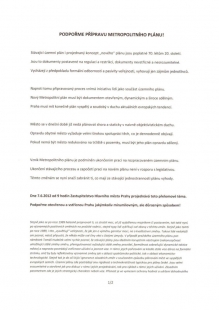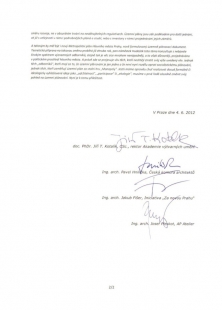The co-authors of the text "Let's Support the Preparation of the Metropolitan Plan!" are Doc. PhDr. Jiří T. Kotalík, CSc., Academy of Fine Arts, Ing. arch. Pavel Hnilička, Czech Chamber of Architects, Ing. arch. Jakub Fišer, Initiative "for a New Prague", Ing. arch. Josef Pleskot, AP Atelier.
The text can be signed on signature sheets available at the Center for Central European Architecture CCEA from 10:00 to 18:00 until Wednesday, June 6, 2012, at 15:00 at the address: CCEA-MOBA, U Půjčovny 4, Prague 1, as on Thursday the metropolitan plan will be discussed at the MHMP council.











